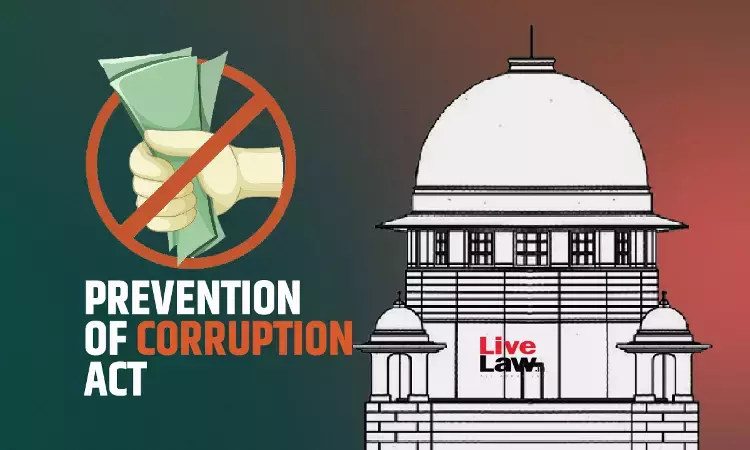- Home
- /
- Top Stories
- /
- Supreme Court Reserves Judgment On...
Supreme Court Reserves Judgment On Petition Challenging S 17A Prevention Of Corruption Act
Gursimran Kaur Bakshi
6 Aug 2025 6:41 PM IST
The Supreme Court today(August 6) reserved judgment in a writ petition challenging the constitutionality of Section 17A of the Prevention of Corruption Act("PC Act"), which was introduced through an amendment in 2018. The writ petition was filed by the Centre for Public Interest Litigation.A bench comprising Justice BV Nagarathna and Justice KV Viswanathan heard Advocate Prashant Bhushan(for...
The Supreme Court today(August 6) reserved judgment in a writ petition challenging the constitutionality of Section 17A of the Prevention of Corruption Act("PC Act"), which was introduced through an amendment in 2018. The writ petition was filed by the Centre for Public Interest Litigation.
A bench comprising Justice BV Nagarathna and Justice KV Viswanathan heard Advocate Prashant Bhushan(for CPIL) and Solicitor General Tushar Mehta(for Union) for two days.
To summarise briefly, Bhushan has challenged Section 17A of the PC Act, arguing that it allows sanction for investigation to be given by the government ministers who themselves are involved in taking high-level decisions. He submitted that the validity of a single directive issued by the Government to the CBI, and Section 6A of the Delhi Special Police Establishment Act, 1946 were struck down in Vineet Narain's judgment and Dr. Subramaniam Swamy case (2014), respectively, because it required prior sanction of the designated authority before initiating investigation against government officers, etc.
Countering these arguments, SG Mehta submitted that the Court must understand that the Vineet Narain and Subramaniam Swamy judgments did not deal with the issue of prior sanction. He argued that Vineet Narain, the Court dealt with the issue in the aspect of the classification test under Article 14 because the Single Directive only allowed CBI to investigate officers. While in Subramaniam Swamy, the Court dealt with the issue of Section 6A restricted to investigation related to Joint Secretary and above in the Central Government and did not include officers of State Governments.
Justice Viswanathan, however, remarked that even today, if Section 6A is re-enacted with including government employees as has been done in Section 17A of the PC Act, it would still be struck down. He said: "Today if S.17A had same words as S.6A but extended to all officers, it would still be struck down because your point is that Sections 6A and Section 17A are qualitatively different. Section 6A said any offence where public servant discharge of duty or not-blanket protection and confined to Joint Secretary and above. Suppose S.17A had said the same thing, so it's really not on classification alone. It is on the substratum also because it completely foreclosed, as opposed to Section 17A, which you are now saying is confined to noting on puffersheets, as they called where decision is taken..."
In this regard, he pointed to another test of Article 14, which is manifest arbitrariness, to test the validity of Section 17A. Mehta responded that manifest arbitrariness is a very "subjective test". Added that even if its tested, unlike Section 6A, Section 17A is narrowly tailored.
He added that the government acts very "methodologically". He referred to the Matajog Dobey vs H. C. Bhari judgment and added that the validity of Section 197 CrPC was upheld on the grounds that there can be a provision to weed out frivolous complaints. "In Matajok, it was accepted that there are certain class which needs filtering...Similar provisions, pre-cognisance provision that in principle, can there be a provisions statutorily made to have a kind of filter to weed out frivolous application," SG Mehta averred.
Mehta also answered a question asked by Justice Viswanathan yesterday about what considerations are made while approving or denying a sanction. Mehta took the Court to a Standard Operating Procedure(SoP) to show how sanctions are granted and who is the competent authority, and in which case. He added that these are "detailed-reasoned orders" served on the affected party. He said: "For instance, if the Minister is involved, the Governor or the President [is the approving authority]. It is as per the Business of Allocation Rules made under the Constitution."
Another issue asked by Justice Viswanathan was whether IPC offences can proceed against a public servant if he gets protection under Section 17A. SG Mehta answered that it would be a very rare instance.
While Bhushan suggested a preliminary inquiry as was suggested in the Lalita Kumari judgment, as an additional safeguard, Mehta responded that the judgment was confined to the interpretation of Section 154CrPC. He added that "fearless good governance" is necessary for the officers to function.
There were no submissions made on the deletion of Section 13(1)(d)(2) as Bhushan accepted SG Mehta's argument that Section 7 of the PC Act includes a situation which makes it an offence if a public servant abuses his position to obtain for himself or any other person any valuable thing or pecuniary advantage.
Case Details: CENTRE FOR PUBLIC INTEREST LITIGATION v UNION OF INDIA|W.P.(C) No. 1373/2018



